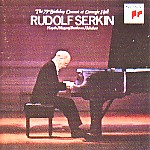For all of the undeniable integrity and rigor marking Rudolf Serkin’s later performances, for listeners their frequent lack of charm and tonal allure was not unlike having to imbibe unpalatable medicine that was good, even necessary for you. In other words, sit up straight, break out that metronome, and take those insistent, clench-fisted downbeats like a man. Indeed, this was my youthful impression of the pianist’s December 1977 Carnegie Hall recital as televised. However, on disc the venerable hall’s ambience adds a flattering patina to Serkin’s usually difficult-to-record sonority and underlines his formidable gifts for projection.
I also appreciate now (as I didn’t then) the fact that Serkin makes subtle yet purposeful and cannily timed departures from the doggedly steady, ascetic course he so often appears to pursue. Examples include the Mozart Rondo’s insightful harmonic inflections, the Haydn Sonata Finale’s careful scaling of dynamics, or the inner rhythmic fire that Serkin still could generate in the Beethoven Les Adieux Sonata’s outer movements, albeit without the steamrolling sheen of his 1950s studio recording.
Interpretively speaking, the Schubert B-flat differs less in concept than in detail when compared to Serkin’s 1975 studio traversal. The latter’s dry, somewhat harsh sound yields to the Carnegie acoustic, and the presence of an audience seems to elicit greater overall mobility on the pianist’s part, especially throughout the final movement (the enormous chances he takes in the coda mostly pay off). The first movement’s low-lying trills are more varied in sound and meaning, and the Scherzo is lighter in demeanor, with Serkin’s unusual elongation of the Trio’s sforzandos emerging more naturally in context. Next to the studio Andante sostenuto’s tonal heft and lyrical reserve, the live counterpart now seems overly severe and even pounded out at the climaxes. Still and all, a great artist’s imprint shapes each selection. Although Japanese Sony made this release available in its entirety for the first time on CD, American collectors now can easily acquire it via Arkivmusic.com’s on-demand reissue program (the booklet notes are in Japanese only). [7/14/2008]
































